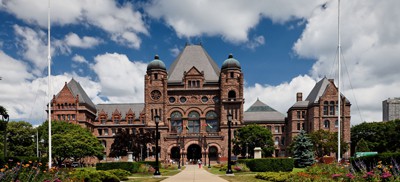 MPPs were off on a constituency week from April 17 to 21, 2017 and returned to the Ontario Legislature on April 24. The following is an update on recent items.
MPPs were off on a constituency week from April 17 to 21, 2017 and returned to the Ontario Legislature on April 24. The following is an update on recent items.
Rural and Remote Education Review
On April 21, the Ministry of Education released details for their consultation regarding Ontario’s Rural Education Strategy. Ten consultations will occur across the province beginning May 5 and ending May 26, 2017. The consultations will include daytime sessions with school boards and municipalities (including student trustees) and evening community town halls. In addition to the in-person meetings, the ministry has posted a document entitled, Supporting Students and Communities: A Discussion Paper to Strengthen Education in Ontario’s Rural and Remote Communities. Feedback can be given via the online discussion paper and all comments are due June 9, 2017. OPSBA will be discussing the paper at an upcoming Policy Development Work Team meeting and drafting a submission. We will also encourage trustees and school board staff to attend a relevant nearby session and/or participate in the online discussion paper.
The dates and locations are:
- Merrickville, Friday, May 5
- Lakefield, Friday, May 5
- Picton, Friday, May 12
- Amherstburg, Tuesday, May 23
- Honey Harbour, Tuesday, May 23
- Thedford, Wednesday, May 24
- Markstay, Wednesday, May 24
- Markdale, Thursday, May 25
- Wawa, Thursday, May 25
- Nipigon, Friday, May 26
Background: On Monday March 6, 2017 a letter was sent to school boards and municipalities from Education Minister Mitzie Hunter and Infrastructure Minister Bob Chiarelli. The letter address “impacts of recent pupil accommodation reviews” and announces the creation of a Rural and Remote Education Review. Three parliamentary assistants have been appointed to lead engagement and research gathering on how to sustain a strong education system in rural and remote Ontario. These individuals are: Education PA Granville Anderson; Agriculture, Food and Rural Affairs PA Grant Crack; and Municipal Affairs PA Lou Rinaldi.
Bill 65, Safer School Zones Act, 2016
Transportation Minister Steve Del Duca introduced the government’s photo radar legislation, Bill 65, Safer School Zones Act on November 15, 2016. The bill would provide municipalities with the option to use three road safety tools:
- Use of automated speed enforcement (photo radar) in two areas: school zones and community safety zones (not on provincial highways)
- Ability to reduce default speed limits (current default speed limit is 50 km/hour)
- Opportunity to gain access/entry to the red light camera program (already in existence; change is to make it easier for municipalities to do this)
The bill has been referred to the Standing Committee on General Government and will have public hearings on April 24, 2017 and April 26, 2017. Written submissions need to be sent to the clerk by end of day Wednesday (5 pm) and can be sent directly to Sylwia Przezdziecki .
OPSBA`s letter will include the following comments and questions:
- Municipalities should have more authority over setting their own speed limits and speed enforcement and ensuring the safety of residents
- School boards need to be involved in the discussion with their municipal counterparts – this is a neighbourhood issue (444 municipalities, 72 school boards)
- Real concern about the number of injuries and even deaths caused by motorists speeding through school zones
- Want to ensure schools and school zones to be as safe as possible – keeping children safe a priority
- Many people affected – child care, school age children (elementary and secondary), parents, caregivers, grandparents, teachers, administrators, education workers, etc.
- Protect children, other vulnerable groups (seniors) and reduce collisions and fatalities
- Protects not just those walking to school but our also students who are bussed
- Will there be signage announcing drivers are entering a school zone or community safety zone?
- Will school zone enforcement be 24/7 or just during school hours? (Schools are occupied longer than 9 am to 3 pm)
- What is the definition of a community safety zone?
- What about the schools in rural and remote areas that are located on provincial highways? Is this to be a city/urban only thing?
- How many kilometres over the speed limit causes a ticket?